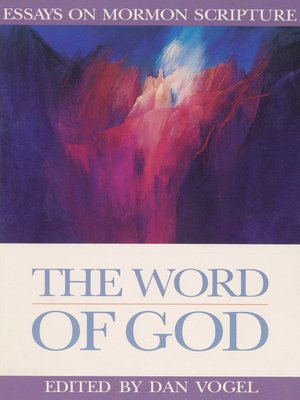
Sign up to save your library
With an OverDrive account, you can save your favorite libraries for at-a-glance information about availability. Find out more about OverDrive accounts.
Find this title in Libby, the library reading app by OverDrive.



Search for a digital library with this title
Title found at these libraries:
| Library Name | Distance |
|---|---|
| Loading... |
Editor's Introduction
by Dan Vogel
[p.vii]Belief in continuing revelation and an open canon of scripture distinguishes Mormonism from mainstream Christianity. That the church founded by Joseph Smith would proceed on grounds of continuing revelation was established at the outset. The day the church was organized, 6 April 1830, Joseph Smith dictated a revelation commanding the church to "give heed unto all his words and commandments which he shall give unto you as he receiveth them,... for his words ye shall receive, as if from mine own mouth, in all patience and faith" (LDS D&C 21:4-5; RLDS D&C 19:2). Another revelation declared that the Lord had "given him the keys of the mysteries, and the revelations which are sealed" (LDS D&C 28:7; RLDS D&C 27:12). The principle of continuing revelation insured a gradual unfolding and canonization of various doctrines.
In addition to the Bible, the official canon of the Utah-based Church of Jesus Christ of Latter-day Saints includes the Book of Mormon (first published in Palymra, New York, in 1830), the Doctrine and Covenants (issued in 1833 as A Book of Commandments [incomplete] and in 1835 in Kirtland, Ohio), and the Pearl of Great Price (first published in England in 1851 and republished with changes in Salt Lake City in 1880). This latter volume of scripture contains selections from Joseph Smith's writings including the Book of Moses (extracted from Smith's "inspired version" or "translation" of the Bible) and the Book of Abraham (taken from Smith's interpretation of an ancient Egyptian papyrus). The Reorganized Church of Jesus Christ of Latter Day Saints, headquartered in Independence, [p.viii] Missouri, the second largest institution tracing its origins to Joseph Smith, publishes its own editions of the Book of Mormon and Doctrine and Covenants, as well as Smith's revision of the Bible, but has not canonized the Book of Abraham.
All but one of the following fifteen essays chosen for inclusion in The Word of God: Essays on Mormon Scripture were written by Mormons from either the LDS or RLDS tradition. (The exception is Susan Curtis.) However, rather than being guided by institutional imperatives, each author has attempted to understand Mormon scripture on its own terms. Additionally, each essay wrestles with the problem of the human and the divine in scripture.
Because one's belief about revelation affects how one approaches scripture, debate about scriptural interpretation often centers on the nature of revelation. The written "word of God" does not come to us direct but rather through human intermediaries. In the words of J. R. Dummelow, writing in A Commentary on The Holy Bible (New York) in 1908, "It is as sunlight through a painted window—the light must come to us coloured by the medium... It is foolish to ignore the existence of the human medium through which the light has come" (p. cxxxv). Book of Mormon prophets, for instance, repeatedly express anxiety over human limitations to convey in language their spiritual teachings. Nephi prays that "the words which I have written in weakness will be made strong" (LDS 2 Ne. 33:4; RLDS 2 Ne. 15:5), and Moroni writes, "if there are faults they are the mistakes of men; wherefore, condemn not the things of God" (Title Page); A position which does not account for the human in revelation will undoubtedly produce disillusionment or distortion.
To consider the human aspects of prophets, revelation, or scripture does not detract from religion, as some traditionalists fear. On the contrary, what cultural and environmental studies challenge are simplistic assumptions about the nature of revelation....







